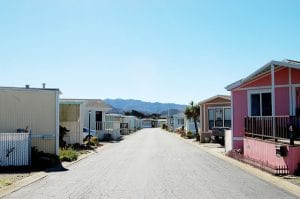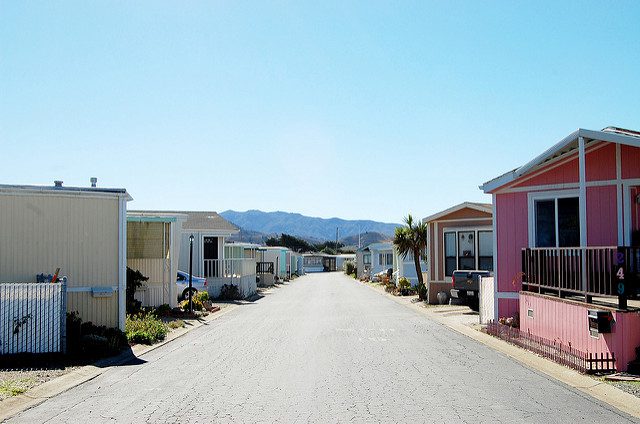
Photo by Todd Lappin via flickr, CC BY-NC 2.0.
Frank Adelmann was bereft when he received an eviction notice from Lowry Grove mobile home park. At 59, he had no resources to move and could not afford another home. The day before the park was to close, Frank ended his life. He was one of ninety-five families who lost their homes. Kids, parents, veterans, and even seniors, some in their eighties, were evicted. Parents struggled, and mostly failed, to find a home they could afford in the same St. Anthony’s school district. And dozens who thought Lowry Grove would be the last home they lived in, suddenly had nowhere to go.
In Minnesota, ten mobile home communities have closed in the past twenty-five years, and no new ones have opened. This uncertainty affects nearly 3 million Americans who are residents in the nation’s 50,000 manufactured housing communities. While most of these people own their homes, they rent the land, which leaves them vulnerable to dramatic rent increases, arbitrary rules, and even eviction.
No one should have to fall asleep wondering if they’ll have a home in the morning. Not in this country. Since I was elected in 2006, I’ve been working in Congress to protect tenants and homeowners. I’ve introduced nearly a dozen bills related to housing, including a few specifically to help owners of manufactured homes. My bills would enable residents in manufactured housing communities to cooperatively purchase and manage the land their homes sit on and provide resources for owners of outdated mobile homes to upgrade to ENERGY STAR manufactured homes. I’ve also worked to protect buyers of manufactured homes from being steered to high-cost loans.
Provide incentives for manufactured housing community cooperatives
Federal policies provide an incentive for homeownership by offering a tax deduction on interest paid on a mortgage. This provision applies to all types of homes, including ones that are cooperatively owned. However, due to a quirk in the tax code, only cooperatively-owned building owners qualify; but when a cooperative owns just the land, the deduction does not apply. Nationwide, there are more than 1,000 manufactured home communities that are cooperatively owned by their residents.
The Fair Tax Treatment for Manufactured Housing Community Cooperatives (H.R. 3399) ensures that cooperatively-purchased land gets the same treatment as cooperatively purchased buildings. Giving manufactured homeowners a small tax incentive to band together and control their destinies is a good first step, but we need to do more to encourage more resident-owned cooperatives in the first place.
When community owners sell, they frequently owe capital gains taxes. Too many times, they choose to delay the sale until their deaths at which time their heirs can claim the property tax free. The Frank Adelmann Manufactured Housing Community Sustainability Act (H.R. 3296) encourages property owners to sell their part of the community to residents, or a nonprofit, to preserve the housing and avoid eviction for hundreds of families.
While a few states require owners offer a right-of-first refusal to tenants, those rules are not always respected. Even when they are, the land costs can be out-of-reach for families who earn an average of $28,000 a year. My bill gives owners a 75 percent federal tax credit on the sale of the property-if they sell to the residents. The math is simple. If the owner sells the land to the residents and earns a profit of $1 million, he would owe $150,000 (15 percent) in capital gains tax. If this bill were to pass, the owner would only pay $37,500 on the sale.
For some owners, these savings would incent them to preserve the property as a manufactured housing community, rather than selling it off to an investor for development.
Replace outdated mobile homes with ENERGY STAR homes
Of the millions of manufactured homes in America, more than two million are outdated, meaning they were built before 1994. Some of these homes have very high energy costs: literally thousands of dollars a year. Yet some families cannot qualify for loans to replace their homes with more energy efficient options.
The Energy Efficient Manufactured Home Act (H.R. 515) creates a federal program to offer grants and loans to help low-income families replace their outdated homes with newer ENERGY STAR homes. My bill builds on current efforts, led by Next Step that help households cut utility expenses, make a commitment to environmental sustainability and improve their health and financial situation.
Eliminating High Cost Loans
Lastly, we must continue to support the work of the Consumer Finance Protection Bureau in its efforts to protect buyers of manufactured homes from unfair treatment and high-cost loans. I opposed a number of Republican-led bills that allow employees of manufactured housing dealerships to steer borrowers to high-cost lenders. Bills like the Financial Choice Act (H.R. 10) and the misnamed Preserving Access to Manufactured Housing (H.R. 1699) would exempt manufactured housing sales people from the Consumer Bureau’s licensing requirements that apply to all mortgage and loan originators.
In mid-September, I offered an amendment to strike language stopping the Consumer Bureau from its prohibition on steering by dealers. My amendment (roll call vote 522) was defeated 163-245. One Republican voted to protect manufactured home buyers, and all but 23 Democrats. Without the Consumer Bureau’s regulation, nothing would stop them from steering homebuyers to bad deals. In addition, these bills also make it easier to charge manufactured home buyers higher interest rates without requiring counseling.
Manufactured housing issues matter to all housing advocates and all Americans. It is the largest source of unsubsidized affordable rental housing in the nation. More than 17 million people live in manufactured homes. If manufactured homes were removed, the homeownership rate would decline by five percent.
By introducing the three bills above, and fighting against efforts to gut the Consumer Bureau and its protections for manufactured homebuyers, I hope to put the power of the federal government behind strengthening the resilience and security of owners of manufactured homes and the communities in which they live and can thrive.






Comments